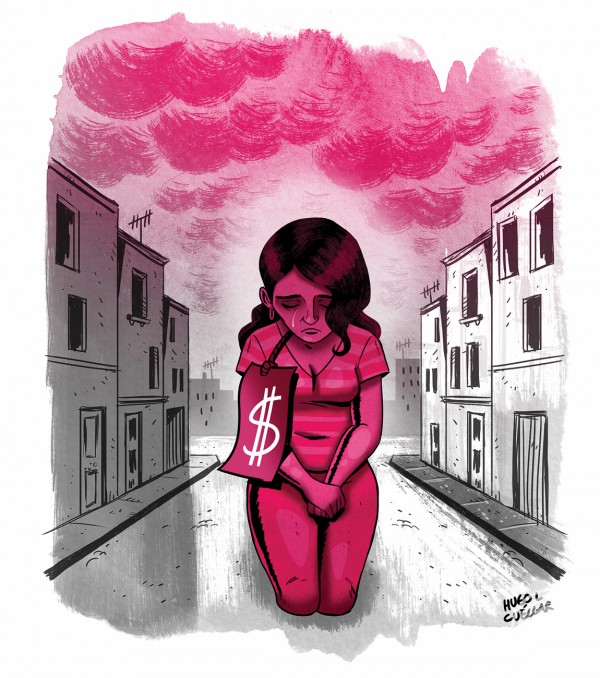Commercial Sexual Exploitation

21 Nov, 2016 | Jet de Kort
Illustration: Hugo L. Cuellar
Battling Human Trafficking in Bolivia
‘We invite you to a briefing about job opportunities in France’s most prestigious
hotel chain: "Hôtel Fleur de l'Ixora". We are looking for receptionists and valets among others, for our two new hotels on the Caribbean islands of Guadeloupe and Martinique. We offer: €1000 per month, medical insurance, accommodation, and French lessons. You haven’t finished your studies yet? No problem. You don’t speak French? It's okay. Most of our guests are Spanish speakers.
This advertisement, calling college students in La Paz and El Alto to an informational gathering about a foreign job opportunity, was distributed on fliers across two university campuses. The recruitment, however, was not organized by a Caribbean hotel chain. In fact, Fleur de l’loxra doesn’t even exist.
The Service and Training Center for Women (CECASEM) created this fake hotel with fake opportunities to raise awareness on the issue of human trafficking. Executive Director Dra. Patricia Bustamante says it was easy to gather students eager to work at this questionable hotel. It shocked her, but unfortunately this is a reality. Across Latin America and other regions, human traffickers promise anything, most of all economic security and a life of excitement and opportunities for young individuals.
Over the past few years, the number of women trafficking cases has increased in Bolivia. According to CECASEM, last year there was a two-percent increase in reported victims than the year before. The trend is particularly felt in rural regions,where women and young girls flee home for a better future. ‘The areas provide little opportunities for development,’ Bustamante explains. ‘Municipalities don’t invest in proper education and training to prevent girls from becoming sex workers.’ These girls are vulnerable, susceptible, and therefore easy targets.
CECASEM addresses human trafficking through research, public awareness, and policy initiatives. According to Bustamante there is a gap between victims and legislation in Bolivia. She believes the government is focused on drug trafficking in the country, but that it needs to tackle the problem of human trafficking as well. ‘If you rob a bank, there is a law; if you steal something, there is a law; but if you traffick a person, there is simply no proper law,’ she points out.
But Bustamante is hopeful for the future of human trafficking victims. Her organization is working with rural municipalities to improve local support and gather testimonies from the victims. ‘We hope to track down the real numbers to create an evident representation of the problem,’ she says.
In the busy streets of La Paz and El Alto, there is another organization that works with victims of human trafficking, specifically sexual exploitation. Munasim Kullakita, which means “learn to love yourself, sister” in Aymara, aims to provide a safe haven for victims and restore the confidence of these women and girls. Some of the victims are underage, abandoned, and homeless. They don’t have money, a place to stay, or work opportunities.
This is where Munasim Kullakita comes in. For the past ten years, the organization has worked with victims of sexual commercial violence in La Paz and El Alto and has recently expanded to other cities in Bolivia. Subdirector Ariel Ramirez Quiroga says it is a challenge to identify and contact the victims. Every week, Munasim Kullakita hits the streets to talk and listen to women and girls who might have been exposed to this type of violence. ‘They are damaged, so we have to be careful with them,’ Ramirez says. ‘Helping them rebuild their trust is a complex and important process.’
When victims accept the help of the organization, they start with simple activities, such as volleyball, to get to know the social workers. Munasim Kullakita also provides medical check ups, where they screen for sexually transmitted diseases. ‘When we are really certain the person feels secure and safe enough, we start the trajectory of professional psychological help,’ Ramirez explains.
The women and girls stay in a safehouse for a minimum of three months. During this time, the organization tries to contact their families, because eventually the women will have to return to their homes and continue their lives. ‘This is a complicated part of our work,’ Ramirez says. ‘Some of them have families who don’t want to take them back.’ For these women and girls, a special program has been created in which they do light work for five hours a day and are expected to study. The goal is to help them build an independent future.
‘This trajectory takes time, but it’s definitely worth it because the rewards are very encouraging,’ Ramirez says proudly. Generating personal contact is time-consuming and costly, but it allows the organization to do the work that the police simply cannot handle. Munasim Kullakita accompanies the victims in their healing process and assists them in reporting their cases to local authorities.
The workers of CECASEM and Munasim Kullakita encounter the bottlenecks of tracking and preventing sexual commercial violence. Reliable data is limited, and many say there isn’t proper legislation for the perpetrators. The voices of the victims are not loud enough to raise more awareness on this issue. They find themselves in onerous situations that are hard to escape from. Both organizations try to tackle the problem from its root by giving girls and women a safe and prosperous environment to protect them from ending up in the hands of the traffickers.
With its fake hotel, CECASEM has demonstrated how easy it is to become ensnared by people looking to exploit others. Along with Munasim Kullakita, it collects horrifying and telling testimonials. In one of them, an anonymous victim, who is only fifteen years old, delineates the hideous atmosphere of the plazas where the girls and women gather and are picked up by men. It is a sad story, but the organizations are working hard to give her and other women a better future.







